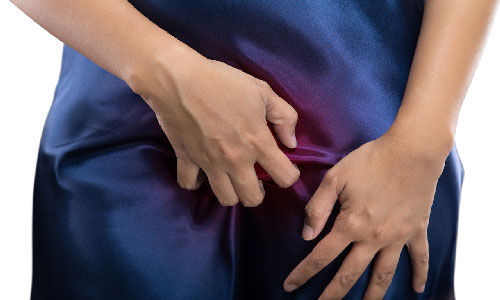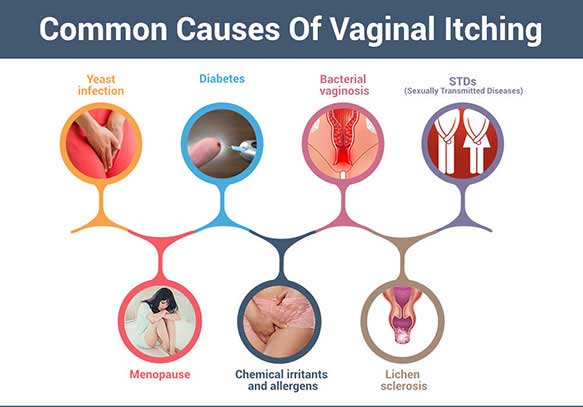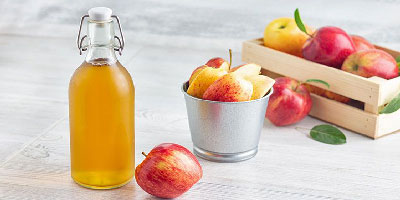There is discomfort due to itching or burning anywhere on the body, but itching or burning in the vagina makes it very uncomfortable.
If you are also suffering from vaginal itching, read below to know about its causes and home remedies for vaginal itching. 👇
The vagina is the most delicate and necessary part of a woman's body. If we don't clean the vagina properly, bacteria start growing there, due to which many problems can be experienced in the vagina, one of which is - vaginal itching.
Vaginal Itching:-
Vaginal Itching is a very common problem. Most women experience vaginal itching during their lifetime. Usually, the vaginal itching problem resolves on its own without any treatment. In some cases, using home remedies also relieves the itching problem.
But sometimes, when itching occurs in the vagina, symptoms like vaginal pain, pimples, blisters, lumps, or burning sensations are seen in the vaginal area. All these things can also be a sign of some serious disease.
If Vaginal itching is persistent or continues for more than a week, you should consult a dermatologist.
Now you have a basic overview of Vaginal itching, below we will know everything about vaginal itching: Causes and symptoms of vaginal itching. Also, discuss Effective Home Remedies for Vaginal Itching.
What Are The Causes Of Vaginal Itching:-

Vaginal itching can be uncomfortable and sometimes painful, often caused by irritating substances, infection, or menopause. It can also occur as a result of certain skin disorders or sexually transmitted diseases (STDs). In rare cases, vaginal itching may develop due to stress or vulvar cancer.
Here are some more possible causes of vaginal itching...
-: Some More Causes Of Vaginal Itching:-

1. Irritants:
Vaginal itching can occur due to exposure to chemicals that irritate the vagina. These irritants can trigger an allergic reaction that causes Vaginal itching in various areas of the body, including the vagina.
Common chemical troubles include:
- soap
- bubble baths
- feminine sprays
- douches
- topical contraceptives
- creams
- ointments
- detergents
- fabric softeners
- scented toilet paper
2. Skin Disorders and diseases:
Some skin diseases, such as eczema and psoriasis, can cause Inflammation and itching of the skin, and redness too around the vagina, can be some of the causes. Eczema, also known as atopic dermatitis, is a rash that primarily occurs in people with asthma or allergies.
The rash is reddish and itchy with a scaly texture. It may spread to the vagina in some women with eczema. Psoriasis is a common skin condition that causes scaly, itchy, red patches to form along the scalp and joints. At times, outbreaks of these symptoms can occur in the vagina as well.
3. Vaginal Yeast infection:
Yeast is a naturally occurring fungus that’s normally present in the vagina. It’s a prevalent condition, affecting 3 out of 4 women at some point in their lives, according to the Mayo Clinic.
The infection often occurs after taking a course of antibiotics, as these types of medications can destroy good bacteria along with bad bacteria.
Good bacteria are needed to keep yeast growth in check. The overgrowth of yeast in the vagina can result in uncomfortable symptoms, including itching, burning, and lumpy discharge.
4. Bacterial Vaginosis:
Bacterial vaginosis (BV) is another common reason for vaginal itching. Like a vaginal yeast infection, BV is triggered by an imbalance between naturally occurring good and bad bacteria in the vagina.
The condition doesn’t always cause symptoms. When symptoms do appear, they typically include vaginal itching and an abnormal, foul-smelling discharge. The discharge may be thin and dull grey or white. In some cases, it might also be foamy.
Also, Read This: How To Lighten Dark Underarms At Home - Get Rid Of Dark Underarms
5. Sexually Transmitted Diseases:
Numerous STDs can be transmitted during unprotected sexual intercourse and cause itching in the vagina. These include:
- chlamydia
- genital warts
- gonorrhoea
- genital herpes
- trichomoniasis
6. Menopause:
Women who are going through menopause or who have already done so are more at risk for vaginal itching.
This is due to the reduction of estrogen levels that occur during menopause, which leads to vaginal atrophy. This is a thinning of the mucosa that can lead to excessive dryness.
The dryness can cause itching and irritation if you don’t get treatment for it.
7. Stress:
Physical and emotional stress can cause vaginal itching and irritation, though this isn’t very common. It might occur when stress weakens your immune system, leaving you more prone to infections that cause itching.
8. Vulvar cancer:
In rare cases, vaginal itching may be a symptom of vulvar cancer. This type of cancer develops in the vulva, which is the external part of the female’s genitals. It includes the inner and outer lips of the vagina, the clitoris, and the opening of the vagina. Vulvar cancer may not always cause symptoms.
However, when symptoms do occur, they may include itching, abnormal bleeding, or pain in the vulvar area. Vulvar cancer can be treated successfully if your doctor diagnoses it in the early stages. This is another reason that yearly gynaecologist checkups are essential.
Home Remedies for Vaginal Itching

1. Use Yogurt For Vaginal Itching
Yoghurt has lactic acid and probiotic properties, which work to balance the good bacteria inside the vagina. It helps combat bad bacterial growth too and brings down Vaginal itching to a large extent as well.
2. Use Garlic for Vaginal Itching
It has antibacterial properties that clean bacteria.
How To Use: Take 1/2 teaspoon of vitamin E oil and 5-7 drops of garlic. Mix it and then apply it to your private area. Wipe it off after 10 minutes. You must apply it once a day.
3. Apple cider vinegar for vaginal itching.

Apple cider vinegar has antifungal and antibacterial properties that kill the microbes inside the vagina.
How To Use: Add 2 teaspoons of apple cider vinegar to a cup of lukewarm water. Then wash your private area with it. Now wipe it with a soft towel. Do this twice a day
4. Aloe Vera for vaginal itching

It contains allicin, antioxidants, and vitamin E, which act to eliminate vaginal itching.
Also, Read This: Home Remedies to Get Rid of Facial Hair ~ Remove Facial Hair
5. Coconut Oil for vaginal itching

Coconut oil has hydrating and medicinal properties which can be capable of treating vaginal Itching and infections. It contains antimicrobial properties.
How To Use: Take pure coconut oil and apply it to the affected area. The effect of fungal infection can be reduced by applying this oil regularly.
6. Cold Compress for vaginal itching
For instant relief from vaginal itching, try the traditional cold compress method. Cold therapy is one of the simplest ways to bring down inflammation and also helps to keep the itches and burns away.
How To Use: Wrap a few ice cubes in a clean cotton towel or plastic bag. Gently press the affected area for a minute. Hold on to the cold compress for a few minutes (keeping in mind your comfort level). Do this thrice a day.
How to stop vaginal itching?
These are easy ways to prevent vaginal itching. Which we always have to take care of. This may reduce the possibility of itching in the vagina ...
- Stop wearing tight fighting clothes.
- Wear comfortable cotton underwear.
- Never keep your genital areas moist.
- Regularly wash your private area with lukewarm water.
- Don't use soap, deodorant, cream, or other such things in your vaginal area.
- Avoid very hot baths because yeast grows in hot and moist environments.






0 Comments